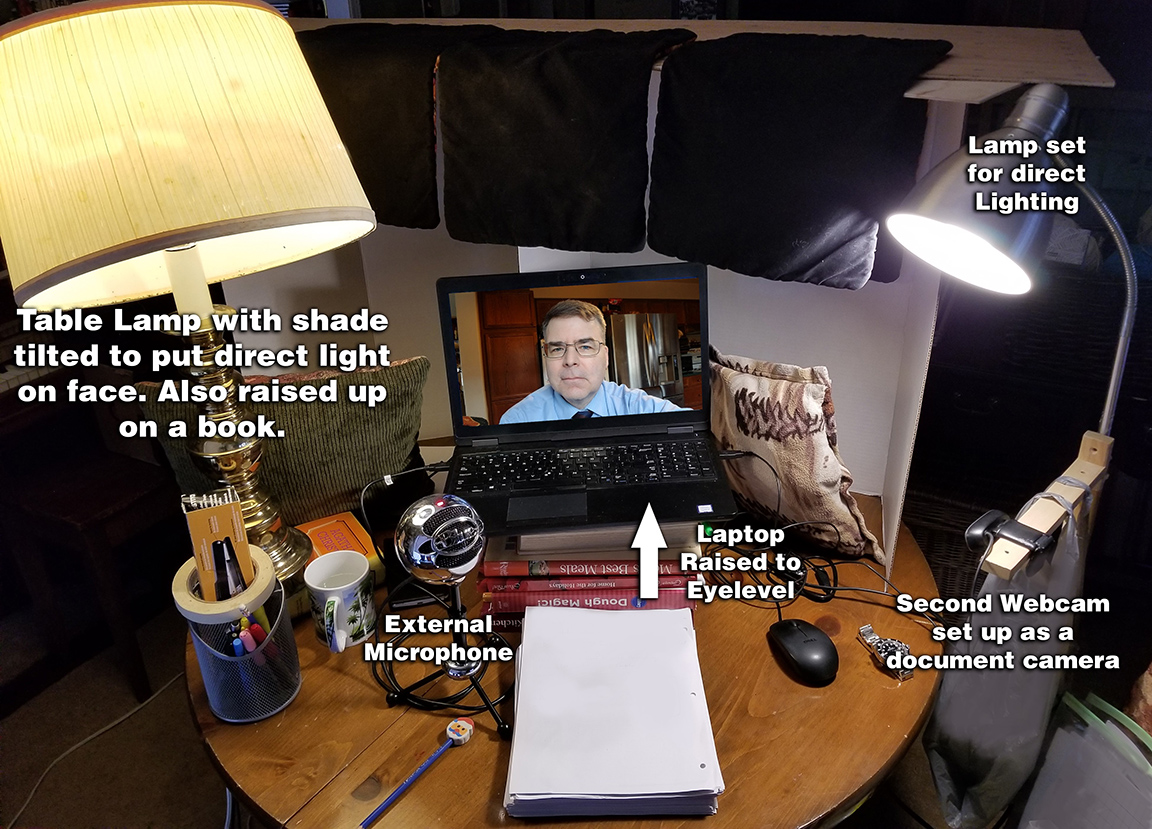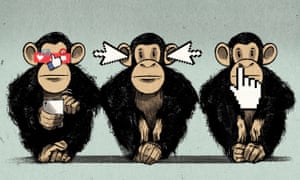Now that all of us are having to teach and meet over videoconferencing on our laptops, it is useful to get advice from the professionals. Chelsea sent me this link to Ryerson professor Gary Gould’s advince on How to Look and Sound Fabulous on a Webcam. The page covers practical things like lighting, positioning of the camera, backgrounds, framing and audio. I realize I need to rethink just having the laptop on my lap.
Category: Internet Culture and Technology
The tech ‘solutions’ for coronavirus take the surveillance state to the next level
Neoliberalism shrinks public budgets; solutionism shrinks public imagination.
Evgeny Morozov has crisp essay in The Guardina on how The tech ‘solutions’ for coronavirus take the surveillance state to the next level. He argues that neoliberalist austerity cut our public services back in ways that now we see are endangering lives, but it is solutionism that constraining our ideas about what we can do to deal with situations. If we look for a technical solution we give up on questioning the underlying defunding of the commons.
There is nice interview between Natasha Dow Shüll Morozov on The Folly of Technological Solutionism: An Interview with Evgeny Morozov in which they talk about his book To Save Everything, Click Here: The Folly of Technological Solutionism and gamification.
Back in The Guardian, he ends his essay warning that we should focus on picking between apps – between solutions. We should get beyond solutions like apps to thinking politically.
The feast of solutionism unleashed by Covid-19 reveals the extreme dependence of the actually existing democracies on the undemocratic exercise of private power by technology platforms. Our first order of business should be to chart a post-solutionist path – one that gives the public sovereignty over digital platforms.
Robots Welcome to Take Over, as Pandemic Accelerates Automation – The New York Times
But labor and robotics experts say social-distancing directives, which are likely to continue in some form after the crisis subsides, could prompt more industries to accelerate their use of automation. And long-simmering worries about job losses or a broad unease about having machines control vital aspects of daily life could dissipate as society sees the benefits of restructuring workplaces in ways that minimize close human contact.
The New York Times has a story pointing out that The Robots Welcome to Take Over, as Pandemic Accelerates Automation. While AI may not be that useful in making the crisis decisions, robots (and the AIs that drive them) can take over certain jobs that need doing, but which are dangerous to humans in a time of pandemic. Sorting trash is one example given. Cleaning spaces is another.
We can imagine a dystopia where everything can run just fine with social (physical) distancing. Ultimately humans would only do the creative intellectual work as imagined in Forester’s The Machine Stops (from 1909!) We would entertain each other with solitary interventions, or at least works that can be made with the artists far apart. Perhaps green-screen technology and animation will let us even act alone and be composited together into virtual crowds.
The Machine Stops
Imagine, if you can, a small room, hexagonal in shape, like the cell of a bee. It is lighted neither by window nor by lamp, yet it is filled with a soft radiance. There are no apertures for ventilation, yet the air is fresh. There are no musical instruments, and yet, at the moment that my meditation opens, this room is throbbing with melodious sounds. An armchair is in the centre, by its side a reading-desk — that is all the furniture. And in the armchair there sits a swaddled lump of flesh — a woman, about five feet high, with a face as white as a fungus. It is to her that the little room belongs.
Like many, I reread E.M. Forester’s The Machine Stops this week while in isolation. This short story was published in 1909 and written as a reaction to The Time Machine by H.G. Wells. (See the full text here (PDF).) In Forester it is the machine that keeps working the utopia of isolated pods; in Wells it is a caste of workers, the Morlochs, who also turn out to eat the leisure class. Forester felt that technology was likely to be the problem, or part of the problem, not class.
In this pandemic we see a bit of both. Following Wells we see a class of gig-economy deliverers who facilitate the isolated life of those of us who do intellectual work. Intellectual work has gone virtual, but we still need a physical layer maintained. (Even the language of a stack of layers comes metaphorically from computing.) But we also see in our virtualized work a dependence on an information machine that lets our bodies sit on the couch in isolation while we listen to throbbing melodies. My body certainly feels like it is settling into a swaddled lump of fungus.
An intriguing aspect of “The Machine Stops” is how Vashti, the mother who loves the life of the machine, measures everything in terms of ideas. She complains that flying to see her son and seeing the earth below gives her no ideas. Ideas don’t come from original experiences but from layers of interpretation. Ideas are the currency of an intellectual life of leisure which loses touch with the “real world.”
At the end, as the machine stops and Kuno, Vashti’s son, comes to his mother in the disaster, they reflect on how a few homeless refugees living on the surface might survive and learn not to trust the machine.
“I have seen them, spoken to them, loved them. They are hiding in the mist and the ferns until our civilization stops. To-day they are the Homeless — to-morrow—”
“Oh, to-morrow — some fool will start the Machine again, to-morrow.”
“Never,” said Kuno, “never. Humanity has learnt its lesson.”
2020 Brings the Death of IT | I, Cringely
It’s the end of IT because your device will no longer contain anything so it can be simply replaced via Amazon if it is damaged or lost, with the IT kid in the white shirt becoming an Uber driver.
How many of us have laughed at The IT Crowd? I remember when I was in support at the University of Toronto and would advise people to turn their computer off and back on. Suprisingly that actually helped in some cases, as did wiggling the cable to the printer (back when there were lots of pins.) Robert X. Cringely, who is apparently not the only Cringely, has a prediction that 2020 Brings the Death of IT in his I, Cringely site. He predicts that all of us working at home in isolation is going to accelerate a computing paradigm called SASE (Secure Access Service Edge – pronounced “sassy”) where individual devices are connected to cloud-based services. IT will disappear because to fix something you will just order another from Amazon. There will be no fixing the local, just replacing it. The rest is all up in the cloud and maintained by someone like Google. Locally we just have appliances.
Econferences: why and how? A blog series
We are all having to learn how to do more remotely. This series of blog posts deals with the why, the what and the how of online conferences.
Open Book Publishers has just published a series of blog entries on Econferences: why and how? A blog series. This series adapts some of the interventions in a forthcoming collection I helped edit on Right Research: Modelling Sustainable Research Practices in the Anthropocene. We and OBP moved quickly when we realized that parts of our book would be useful in this time when all sorts of scholarly associations are having to move to online conferences (econferences.) We took two of the case studies and put preprints up for download:
- ‘Greening’ Academic Gatherings: A Case for Econferences – This describes the Around the World Conferences we developed at the Kule Institute.
- Online Conferences: Some History, Methods, and Benefits by Nick Byrd is about a series of philosophy econferences.
I have also written a quick document on Organizing a Conference Online: A Quick Guide.
I hope these materials help and thank Chelsea Miya, Oliver Rossier and Open Book Publishers for moving so quickly to make these available.
(Against) Virus as Metaphor
Our fondness for viruses as metaphor may have kept us from insisting on and observing the standards and practices that would prevent their spread.
Paul Elie in the New Yorker has a comment (Against) Virus as Metaphor (March 19, 2020) where he argues that our habit of using viruses as a metaphor is dangerous. He draws on Susan Sontag’s Illness as Metaphor to discuss how using the virus as metaphor can end up both misleading us about what is happening on the internet with ideas and memes, but can also cast a moral shadow back onto those who have the real disease. It is tempting to blame those with diseases for moral faults that presumably made them more vulnerable to the disease. The truth is that diseases like viruses pay no attention to our morals. There is nothing socially constructed or deconstructed to the Coronavirus. It wasn’t invented by people but it has real consequences for people. We have to be careful not to ascribe human agency to it.
Covid-19 Notice on YouTube

When you go to YouTube now in Canada, a notice from the Public Health Agency of Canada pops up inviting you to Learn More from a reliable source. This strikes me a great way to encourage people to get their information from a reliable source rather than wallow in fake news online. This is particularly true of YouTube that is one of the facilitators of fake news.
More generally it shows an alternative way that social media platforms can fight fake news on key issues. They can work with governments to put appropriate information before people.
Further, the Learn More links to a government site with a wealth of information and links. Had it just been a short feel good message with a bit of advice, the site probably wouldn’t work to distract people towards reliable information. Instead the site has enough depth that one could spend a lot of time and get a satisfying picture. This is what one needs to fight fake news in a time of obsession – plenty of true news for the obsessed.
When Coronavirus Quarantine Is Class Warfare
A pandemic offers a great way to examine American class inequities.
There have been a couple of important stories about the quarantine as symbolic of our emerging class structure. The New York Times has an opinion by Charlie Warzen on When Coronavirus Quarantine Is Class Warfare(March 6th, 2020).
That pleasantness is heavily underwritten by a “vast digital underclass.” Many services that allow you to stay at home work only when others have to be out in the world on your behalf.
The quarantine shows how many services we have available for those who do intellectual work that can be done online. It is as if we were planning to be quarantined for years. The quarantine shows how one class can isolate themselves, but at the expense of a different class that handles all the inconveniences of material stuff and physical encounters of living. We have the permanent jobs with benefits. They deal with delivering food and trash. We can isolate ourselves from diseases, they have to risk disease to work. The gig economy has expanded the class of precarious workers that support the rest of us.
Continue reading When Coronavirus Quarantine Is Class Warfare
The Prodigal Techbro
The journey feels fake. These ‘I was lost but now I’m found, please come to my TED talk’ accounts typically miss most of the actual journey, yet claim the moral authority of one who’s ‘been there’ but came back. It’s a teleportation machine, but for ethics.
Source:
Maria Farrell, a technology policy critic, has written a nice essay on The Prodigal Techbro. She sympathizes with technology bros who have changed their mind, in the sense of wishing them well, but feels that they shouldn’t get so much attention. Instead we need to care for those who were critics from the beginning and who really need the attention and care. She maps this onto the parable of the Prodigal Son; why does the son who was lost get all the attention? She makes it an ethical issue, which is interesting, one I imagine fitting an ethics of care.
She ends the essay with this advice to techies who are changing their mind:
So, if you’re a prodigal tech bro, do us all a favour and, as Rebecca Solnit says, help “turn down the volume a little on the people who always got heard”:
- Do the reading and do the work. Familiarize yourself with the research and what we’ve already tried, on your own time. Go join the digital rights and inequality-focused organizations that have been working to limit the harms of your previous employers and – this is key – sit quietly at the back and listen.
- Use your privilege and status and the 80 percent of your network that’s still talking to you to big up activists who have been in the trenches for years already—especially women and people of colour. Say ‘thanks but no thanks’ to that invitation and pass it along to someone who’s done the work and paid the price.
- Understand that if you are doing this for the next phase of your career, you are doing it wrong. If you are doing this to explain away the increasingly toxic names on your resumé, you are doing it wrong. If you are doing it because you want to ‘give back,’ you are doing it wrong.
Do this only because you recognize and can say out loud that you are not ‘giving back’, you are making amends for having already taken far, far too much.





